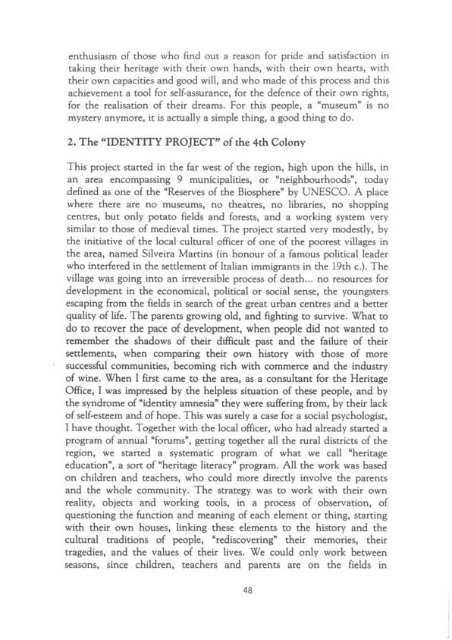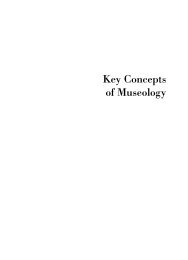ISS 25 (1995).pdf - The International Council of Museums
ISS 25 (1995).pdf - The International Council of Museums
ISS 25 (1995).pdf - The International Council of Museums
Create successful ePaper yourself
Turn your PDF publications into a flip-book with our unique Google optimized e-Paper software.
enthusiasm <strong>of</strong> those who find out a reason for pride and satisfaction in<br />
taking their heritage with their own hands, with their own hearts, with<br />
their own capacities and good will, and who made <strong>of</strong> this process and this<br />
achievement a tool for self-assurance, for the defence <strong>of</strong> their own rights,<br />
for the realisation <strong>of</strong> their dreams. For this people, a "museum" IS no<br />
mystery anymore, it is actually a simple thing, a good thing to do.<br />
2. <strong>The</strong> "IDENTITY PROJECT" <strong>of</strong> the 4th Colony<br />
This project started in the far west <strong>of</strong> the region, high upon the hills, in<br />
an area encompassing 9 municipalities, or "neighbourhoods", today<br />
defined as one <strong>of</strong> the "Reserves <strong>of</strong> the Biosphere" by UNESCO. A place<br />
where there are no museums, no theatres, no libraries, no shopping<br />
centres, but only potato fields and forests, and a working system very<br />
similar to those <strong>of</strong> medieval times. <strong>The</strong> project started very modestly, by<br />
the initiative <strong>of</strong> the local cultural <strong>of</strong>ficer <strong>of</strong> one <strong>of</strong> the poorest villages in<br />
the area, named Silveira Martins (in honour <strong>of</strong> a famous political leader<br />
who interfered in the settlement <strong>of</strong> Italian immigrants in the 19th c.). <strong>The</strong><br />
village was going into an irreversible process <strong>of</strong> death ... no resources for<br />
development in the economical, political or social sense, the youngsters<br />
escaping from the fields in search <strong>of</strong> the great urban centres and a better<br />
quality <strong>of</strong> life. <strong>The</strong> parents growing old, and fighting to survive. What to<br />
do to recover the pace <strong>of</strong> development, when people did not wanted to<br />
remember the shadows <strong>of</strong> their difficult past and the failure <strong>of</strong> their<br />
settlements, when comparing their own history with those <strong>of</strong> more<br />
successful communities, becoming rich with commerce and the industry<br />
<strong>of</strong> wine. When I first came to the area, as a consultant for the Heritage<br />
Office, I was impressed by the helpless situation <strong>of</strong> these people, and by<br />
the syndrome <strong>of</strong> "identity amnesia" they were suffering from, by their lack<br />
<strong>of</strong> self-esteem and <strong>of</strong> hope. This was surely a case for a social psychologist,<br />
I have thought. Together with the local <strong>of</strong>ficer, who had already started a<br />
program <strong>of</strong> annual "forums", getting together all the rural districts <strong>of</strong> the<br />
region, we started a systematic program <strong>of</strong> what we call "heritage<br />
education", a sort <strong>of</strong> "heritage literacy" program. All the work was based<br />
on children and teachers, who could more directly involve the parents<br />
and the whole community. <strong>The</strong> strategy was to work with their own<br />
reality, objects and working tools, in a process <strong>of</strong> observation, <strong>of</strong><br />
questioning the function and meaning <strong>of</strong> each element or thing, starting<br />
with their own houses, linking these elements to the history and the<br />
cultural traditions <strong>of</strong> people, "rediscovering" their memories, their<br />
tragedies, and the values <strong>of</strong> their lives. We could only work between<br />
seasons, since children, teachers and parents are on the fields in<br />
48<br />
I<br />
J
















